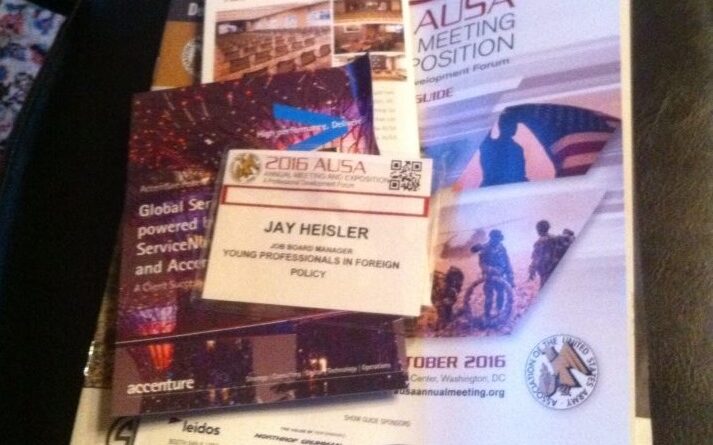Reform Needed in Intelligence Recruiting Process
By Jay Heisler
Earlier this year, I went with an unusual request to friends who are ex-CIA. I had spoken with a reporter with the Federal News Network, a DC area radio station, about an interview in which I was to explain why I dropped out of the CIA application process due to the security clearance process dragging on too long. These friends, who I was working closely with volunteering on a natural disaster response project, both said to do the interview.
So I did the interview, one of several interviews done by this reporter for that story, entirely unsure about how my network, plus my friends and family, would respond. After a week of stressing out, I realized that all this worrying happened only for the reporter to put the project on the back burner, never to pick it up again.
However, I feel my story is worth sharing with the world as it has ramifications for improving, or even reforming, the CIA application process.
I did not get that far in my CIA application process. I signed no NDA, did no medical tests or polygraph. What I got was an employee referral, a mock interview with a currently serving CIA employee in preparation for a real interview, a phone call from CIA headquarters out of the blue to ask me some questions, a second and then third employee referral from an ex-CIA employee and another currently serving CIA employee, and several conversations with someone who identified themselves as a CIA background investigator. The rest of the process I never saw as I moved on from my applications. During this time the position I applied for changed from analyst to targeting officer.
This followed years of going through a similar process applying for an intelligence analyst position with NSA, and before that I was on a hiring wait list for an intelligence analyst position with the US Department of State.
This all unfolded over a jaw-dropping number of years in which I was caught in career limbo. The hiring process for intelligence careers has a lot of mythology around it, and it is often clear that some of its tortures are by design. However, I can say there are a few areas where reform is needed.
First, there needs to be more care taken for US citizens who live in other countries. As a US citizen living and working in Canada, I was told several times by NSA that I needed to return to US soil at my own expense for my applications to continue. A heart-breaking Catch-22, I was being asked to risk a huge personal expense moving back to US soil without a job offer in hand, just in the hope of getting a future job. At the time it came across as seriously barbaric and counterproductive as the best and brightest US citizens are likely to have substantial experience overseas, but are not necessarily going to be able to afford to sit around in DC for a few months without work waiting for a possible job offer. This sense that the process was barbaric was driven home by NSA not actually hiring me when I did move back to the DC area to work as a temp, meaning I actually had to break my lease in Falls Church and return home in defeat.
Second, there needs to be more accountability if a failed application process leaves a significant gap on someone’s CV. Before NSA, I sat around in good faith waiting for that State Department hiring wait list to produce a job, as I figured the world’s richest and most powerful democracy would not ruin someone’s life like that, only to find out the job went to someone else instead after I destroyed my CV and a lot of credibility with friends and family waiting endlessly for it to pan out. Having called State to ask about what happened and where my apology was, I got an angry and dismissive response on the phone.
As for the CIA process, I found it to be considerably better than the process for State or NSA. For starters, at least the agency’s recruiters were stringing me along when I had prestigious, albeit underpaid, work to keep me going while I waited. This included DC-based remote work and teaching at local universities, hardly the extreme instability of my years waiting on State and NSA in which, fresh out of a mental health crisis, I eventually had to work as an event security guard in my home town, after having previously worked as a journalist and in various DC office jobs.
However, the CIA process too dragged on indefinitely until eventually I gave up. Instead, I went to the agency with the suggestion I get future work as a contractor advising on ways the agency could reform workplace mental health policy, especially as related to hiring. I got quite a bit of traction from CIA leadership with that idea, so that is my long term plan. I am still getting quite a bit of interest in the field.
When it comes to the CIA process in particular, I can say the room for improvement is the third suggestion I have.
I have spoken with past and present CIA personnel on various volunteer projects for now several years. I can say I have heard from an inside source that there is concern at the agency that there has not been enough effort to bring in remote work options for CIA employees. Was my hiring delayed indefinitely because I never returned to DC? Unlike with NSA, I was not told this openly on the phone, although there I was years later and there had been no progress once again. And this time I would have needed to leave work I valued. Imagine being told again I did not get the job and had to break another lease and return home in defeat, but this time having given up a university lecturer gig I managed to get without having finished a doctorate and a successful revived journalism career! So what I am getting from former CIA employees is what I would argue is of the utmost urgency as it would have possibly solved my absurd and endless crisis waiting for a career that never materialized.
We live in a different world from the one where these rules were built, and certainly they need to be updated. I believe we no longer live in a world where living on US soil is that much safer from exposure to foreign influence than living in an allied state like Canada. I believe we no longer live in a world where people will tolerate excessive bureaucracy that could have detrimental effects on their lives and career. And I believe we no longer live in a world where America’s eyes and ears around the world should have few remote work options. I hope sharing my story brings the change requested by former CIA employees and prevents others from experiencing my fate, which included many long and cruel years of my career down the drain, from which I still have not really recovered.
Jay Heisler is Voice of America’s Canada correspondent. He also teaches a mental health advocacy course at a Canadian university and works on various training and education projects in national security in the US and Canada. He is currently working on a book contract and at other freelance writing.



